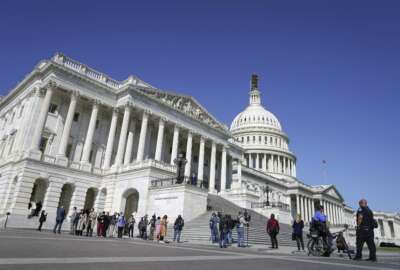IRS gets pushback on its return-to-office plans — for going too far, and not far enough
Members of Congress say the IRS isn’t setting a high enough standard for in-office work, and that constituents remain unable to get their tax questions answered...
The Internal Revenue Service is getting pushback over its recently announced return-to-office plans — both for going too far, and not going far enough.
Members of Congress say the IRS isn’t setting a high enough standard for in-office work, and that constituents remain unable to get their tax questions answered by IRS employees.
Meanwhile, the federal employee union that represents much of the IRS workforce says the agency is rolling back a key benefit that helps it recruit new employees and keep current ones on the job.
Rep. Ron Estes (R-Kan.), citing Federal News Network’s coverage of IRS return to office plans, wrote in the Wall Street Journal on Sunday that his office has seen a higher volume of constituent complaints with the IRS in recent years, “suggesting IRS staff were more effective at their jobs before the pandemic.”
Estes wrote that his office opened three times as many IRS-related constituent cases in 2023 than in 2019, and that based on the number of complaints, a 50% return to the office “may not be sufficient.”
“Taxpayers are stuck with delayed resolutions when the agency isn’t as effective. The time a taxpayer spends on the phone, chasing paperwork or dealing with technical glitches takes away from productivity,” Estes wrote. “Some might argue that teleworking, with reduced overhead, offers a tax-saving benefit, but that’s realized only if the agency is providing adequate customer service. The IRS isn’t.”
The National Treasury Employees Union, however, says IRS employees have been teleworking for decades — but in greater numbers since 2020, when the COVID-19 pandemic led to mandatory telework for many employees.
“Telework works, and I believe telework is here to stay,” NTEU National President Doreen Greenwald told reporters at the union’s annual legislative conference on Feb. 27. “This union is very supportive of telework, and we are going to be on the Hill talking about the successes of telework.”
Greenwald told reporters that IRS call center employees have seen productivity gains after gaining the ability to telework in 2020.
The IRS says its level of phone service exceeded its 85% goal last year, after tapping into billions in multi-year funds under the Inflation Reduction Act to hire more call center representatives.
“We fought for years to give them telework. Not until the pandemic were they able to get funding to give them the computer systems to be able to access and take phone calls,” Greenwald said. “They are on the systems, the same as they would be in their offices, answering calls.”
At a time when the IRS is tapping into billions in multi-year modernization funds to rebuild its workforce, Greenwald said the agency, by rolling back telework, is limiting one of its most attractive benefits to prospective hires — flexibility.
Greenwald said the “federal government can’t compete on pay.” The Federal Salary Council estimates federal employees are paid about 27% less than their private-sector counterparts.
“People like IT professionals, that they need desperately to move the government into this generation of technology, one of the things that brings them there is that flexibility,” Greenwald said. “We also know there is a skilled workforce out there, like single moms that rely on telework to be able to apply for these jobs and work. You don’t want to leave that diverse workforce on the sideline, not able to compete for these jobs because those flexibilities aren’t there.”
The Treasury Department’s own telework assessment it provided to Congress a few months ago “found no evidence that telework created a negative impact on retention, recruitment, or organizational performance.”
The report also found that since the pandemic, job announcements highlighting work flexibilities, such as telework, attracted the largest volume of applications. The report found remote jobs yielded the most hires, and that retention and engagement scores have remained stable.
“They know it helps them recruit. They know it helps people stay. It gives them more work-life flexibilities. It gives them higher morale, because they’re able to manage their home and work life, and they’re able to stay working for the mission,” Greenwald said. “So, we’re all on board with telework, and we’re going to sing it to the roof, because it works.”
Greenwald said the IRS rolling back telework will “absolutely” impact the agency’s ability to attract talent.
“If they don’t offer it, private companies do. And so, they’re having to compete with less pay. Tying their hands to having that kind of flexibility will make it difficult for them to get the skilled workers they need to fill those jobs,” she said.
Greenwald said the push to bring federal employees back to the office ignores the fact that federal employees are just as likely to spend their office hours in Zoom or Teams calls, than they are to collaborate with other in-office workers.
“I may be in a group with two people here, two people in Virginia, two people in California, two people in Texas. So [for] me to come into the office, to connect on a computer, to talk to the rest of the people around the country, doesn’t make sense,” she said.
IRS Commissioner Danny Werfel told employees in a Feb. 16 email that the IRS will discuss any potential changes for bargaining unit employees with the National Treasury Employees, but said bargaining unit employees “are not immediately affected by today’s announcement.”
“For bargaining unit employees, any changes from our current status will only occur with direct consultation and engagement with NTEU leadership,” he wrote.
Greenwald, however, told reporters, that the agencies setting an “arbitrary percentage” of in-office work “makes no sense.”
“We stand by our contracts, and we have no intention of changing those, because we believe they work. And we were at the table with the agency when we set those parameters,” Greenwald said.
Estes, in his op-ed, wrote that studies show “wide-ranging findings” on telework’s impact on productivity. He cited studies showing telework either increased or decreased productivity.
“With such inconsistent data, it’s incumbent on individual businesses to determine how best to attract workers and meet customers’ needs,” he wrote.
Greenwald however, said federal employees have been teleworking long before the pandemic, and that agencies continue to benefit from workplace flexibilities.
“We’ve seen a greater increase in telework since the pandemic, but we’re advocating for where that made sense and where people can continue to work in that environment and be successful at it,” Greenwald said.
“Telework has been around for decades. And what’s nice about telework is whether you’re working in the office, or in the telework environment, it’s no different. You do the same work, you work the same hours, you accomplish the same things. So, identifying where you’re performing that work is not going to give you the data that they claim they need,” she added.
Copyright © 2025 Federal News Network. All rights reserved. This website is not intended for users located within the European Economic Area.
Jory Heckman is a reporter at Federal News Network covering U.S. Postal Service, IRS, big data and technology issues.
Follow @jheckmanWFED






